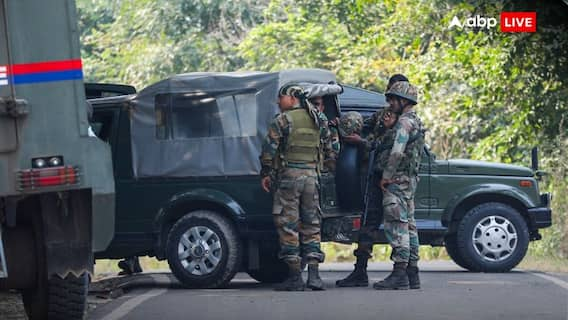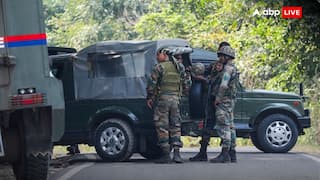'People Living In Agony': Somalia Spearheads Offensive Against Al-Shabab, Says Report
Speaking with AP, one of the several witnesses Adow stated: “The people were living in agony."

For the last 13 years, extremists affiliated with al-Qaida's East Africa offshoot have ruled Mohamud Adow's town in central Somalia, enforcing severe doctrine and detaining local instructors and traditional elders, news agency Associated Press (AP) reported.
Then came word that Somali soldiers had ousted the rebels from surrounding areas in an unexpected countrywide attack.
In August, a small number of people snuck out one night to meet with Somali troop leaders and invite them to Rage-El. Adow, 80, was among those who took up arms, joining a local militia battling alongside Somali soldiers with broken rifles in remote fights.
Speaking with AP, one of the several witnesses Adow stated: “The people were living in agony."
Adow and others across the Horn of Africa nation are being encouraged to stand up to the al-Shabab extremists who have long embedded in Somali society, exploiting clan divisions and extorting millions of dollars a year from businesses and farmers in their quest to impose an Islamic caliphate.
On Thursday, Somalia's government declared a "people's rebellion" in order to exert pressure on al-Shabab from all sides, including financial ones.
It is being billed as the most serious operation against the al-Shabab terrorist organisation in more than a decade. And this time, Somali warriors are in command, supported by US and African Union soldiers.
Thousands of Al-Shabab fighters have slowed the country's rehabilitation from decades of strife by carrying out audacious strikes in Mogadishu and elsewhere. Countries ranging from Turkey to China to the European Union have invested in military training and other counterterrorism assistance throughout the years.
Last weekend, the United States offered a tiny but symbolic $9 million transfer of heavy weaponry and equipment to Somalia's National Army, whose capabilities have long been questioned as it prepares to take over the country's security from an African Union multinational force by the end of next year.
“We cheer the success achieved by Somali security forces in their historic fight to liberate Somali communities suffering under al-Shabab,” U.S. Ambassador Larry Andre was quoted by AP in its report.
According to a database maintained by International Crisis Group researcher Omar Mahmood, the Somali government claims more than 1,200 terrorists have been killed since August. Such accusations are unsubstantiated.
A populace driven to the brink by a record drought is critical to the offensive's success. Somalis fleeing al-Shabab-held villages have highlighted the militants' draconian taxation demands while livestock and crops wither and perish and millions go hungry.
"They are being rented out like houses; they are telling you that their livestock are being taken away without permission," said Gen. Abdirahman Mohamed Tuuryare, former director of Somalia's national intelligence agency and commander of the Middle Shabelle battle against al-Shabab. "Even the child born today will have to pay."
Residents have also said that al-Shabab forces sons to become suicide bombers and kills others at random.
Tuuryare recalled a brutal struggle last year over the Masjid Ali-Gadud neighbourhood in which 200 al-Shabab rebels and "several" soldiers were slain. It took awhile to persuade apprehensive locals to return to a neighbourhood where even Quranic schools were shuttered. Only training facilities for bombers and fighters were operational.
Tuuryare stated that after 15 years of al-Shabab brainwashing, villagers found it difficult to believe that fellow Somalis had come to rescue them.
Ibrahim Hussein, a local, was still adapting. According to him, Al-Shabab soldiers forcibly recruited adolescent males and coerced women into marriage, and any found guilty of adultery would be stoned to death or publicly flogged.
Still, security was good: “For instance, when a prayer is called, everyone goes toward the mosque without closing their properties. Nobody can touch them. If anyone is found stealing, he or she will face amputation of a limb or limbs,” Hussein said.
He voiced a desire for further US military assistance, including additional drone attacks against al-Shabab and a US effort at the United Nations Security Council to overturn an arms embargo on Somalia to allow for easier access to heavy weaponry.
Former Somali government security adviser Samira Gaid warned in an analysis for the Combating Terrorism Center at West Point that the offensive's success could be fleeting if Somalia's still-fragile government does not focus on winning hearts and minds and addressing the clan rivalries al-Shabab has long exploited.
“This is still a remarkable offensive as, for the first time, we see a citizen awakening that is supported by the federal government,” she informed the AP.
For years, Somalis have perceived the struggle against al-Shabab as being spearheaded by foreign forces such as the African Union or troops from neighbouring Ethiopia and Kenya.
Kenya is already beefing up border security to apprehend fugitive militants, and the US offered million-dollar incentives this month for al-Shabab commanders suspected of significant assaults.
Under pressure, al-Shabab retaliated by murdering at least 120 people in October at a key junction in Mogadishu.
But there is hope for Somalis who have been isolated from loved ones for a long time due to extremism.
Hassan Ulux, a 60-year-old traditional elder, fled his War-isse town a decade ago and dreaded returning until it was just liberated from al-Shabab.
“Praise be to Allah,” he said, finally home. “Now they are on the run. Now we can talk about education and normalcy.”
(With Inputs From AP)
Trending News
Top Headlines






































